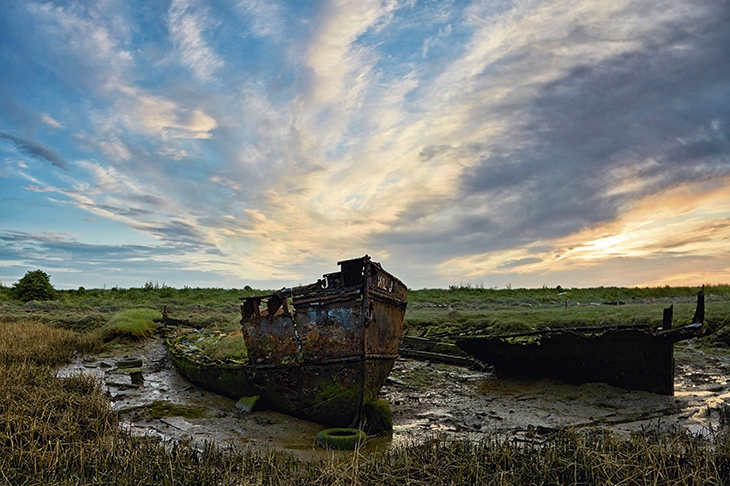We ought to cherish the haunted landscape of the Thames Estuary while we can. The grey hulks of old power stations, the white domes of oil refineries, the sternly rectilinear factories, all of which once seemed oppressive, are now instead poetic because of their near extinction. Caroline Crampton’s atmospheric and movingly written exploration of the Thames, and that once-industrial estuary, is especially illuminating on the soul of the river; and she investigates satisfyingly what it is in these silent marshes and concrete embanked paths that still generates such an odd sense of unease.
Her relation to the river and the sea beyond is especially strong: her parents built their own sailing boat and, years ago, voyaged all the way from South Africa to London, first finding a berth in the yuppified St Katharine’s Dock by the Tower of London, but then some months later settling on the Isle of Sheppey in Kent; a region of wheeling marsh birds that is only 30 miles from the centre of the City and yet on misty winter days can feel as remote as St Kilda.
The patterns of Crampton’s life are coloured by the estuary: the flow of childhood weekends sailing out into the sea, the aching periodic desire to return to these stern horizons of dark inlets and tiny shingly villages. Crampton begins, though, with another origin: the elusive source of the Thames at Cricklade in Gloucestershire. From here, walking a dry pebbly path that in rainier conditions fills and trickles and gushes, she begins to glide downriver through national and personal history; from the serious intensities of her own time at Oxford; on to the dappled Thames of The Wind in the Willows and Jerome K. Jerome and Stanley Spencer which is now an unchangeable idyll of luxuriant green banks locked forever in one imaginary moment of time. The book finds fresh freedom as Crampton takes to the wider waters and sails down beyond Tower Bridge.
There is nostalgia for picturesque dereliction; her parents remembered how in the 1970s, the empty 19th-century warehouses that made up the riverfront at Wapping and Limehouse (and which of course are now charming apartments) were crumbling into the water. The tallest buildings amid the closed-down docks on the Isle of Dogs were council tower blocks. The north Greenwich peninsula now occupied by the Dome was a vast industrial gasworks.
Not all change is bad; the working river was also, chemically, dead. In 1878, there was the suffocating horror of the sinking of a pleasure steamer called Princess Alice by Gallions Reach; hundreds of drowning holidaymakers were poisoned in effluent issuing from the Great Northern Sewer and their corpses turned indigo. Crampton makes us aware that even though the river has recently returned to clean, vigorous life — otters, salmon, sweet tiny sea-horses —those who sail it must always be watchful. That sense of the river’s muscle and will is conveyed strongly in Crampton’s boating passages; the insistent tug of tides, the elemental power of the currents.
Perhaps that vulnerability is part of the wider unease evoked by the region; so famously expressed by the estuary dwelling author Joseph Conrad in Heart of Darkness (‘and this also has been one of the dark places of the earth’), and in Dickens’s image of the escaped convict Abel Magwitch on the Hoo marshes in Great Expectations. The procession of history — from Queen Elizabeth at Tilbury to the vast steamships sailing out into the world with imperial rapacity — is one thing; but some of the small towns seeking sustenance from the river have seen — and continue to see now — stark poverty. Centuries back, the mudbanks were a breeding ground for malarial mosquitoes. Sailors were held in quarantine near Sheppey; those who died were buried haphazardly in the marshes. Through the slow, restless movement of the mud, coffins and bones found their way to the surface, and continue to do so today.
Sheppey and the Hoo peninsula are now sought after by visitors who crave unsettling solitude: the weird silence of the wide busy river even as vast tankers sail by; the eyeless ruins of the 19th-century military Cliffe Fort; the silt wind riffling reeds. Not far from here, the construction of the vast new London Gateway port, clean and robotic and quiet, starkly monumental with giant sky-dominating cranes, has rearranged and churned miles of ancient mud on the opposite shores; since the Romans first sailed upriver 2,000 years ago, the estuary has been about commerce and conquest. But the river has never lost its own brooding identity, and probably won’t even in a future of wetland sanctuaries and perky lines of new-build eco-houses.
In Crampton’s rich and haunting journey, we start to understand the disquiet. Despite the accumulation of flotsam and memories, the estuary is fundamentally about impermanence and transformation, and being pulled by the tides out into the vast sea of night.
The Way to the Sea: The Forgotten Histories of the Thames Estuary
Author: Caroline Crampton
Publisher: Granta
Page count: 300
Price: £14.99






Comments